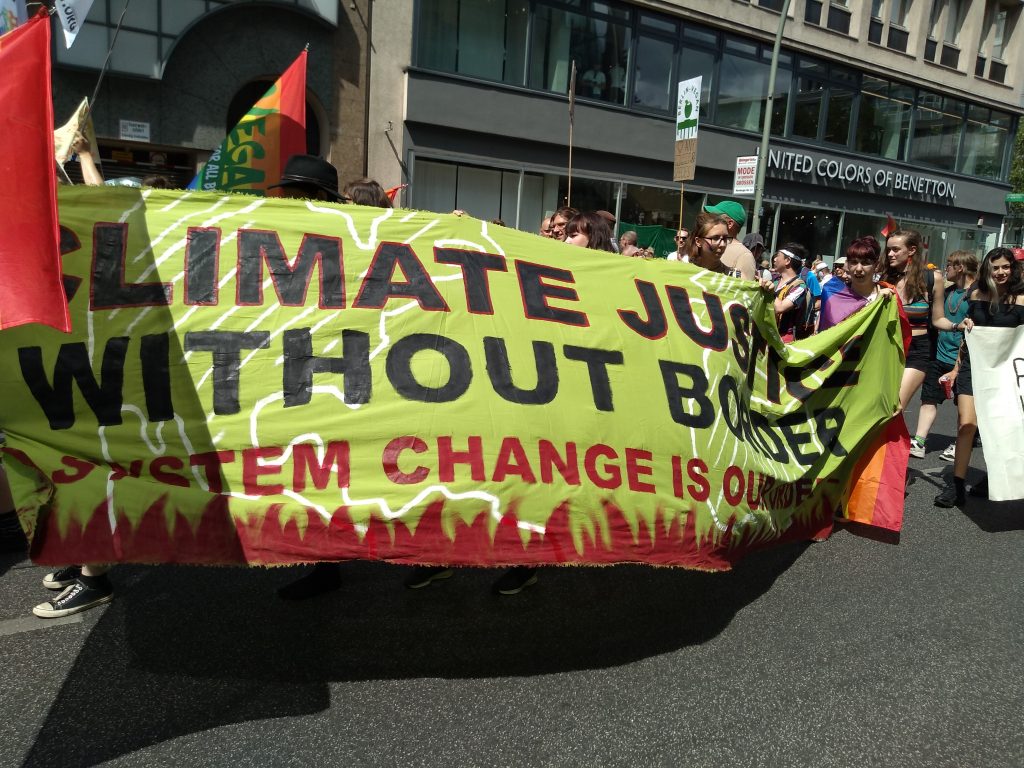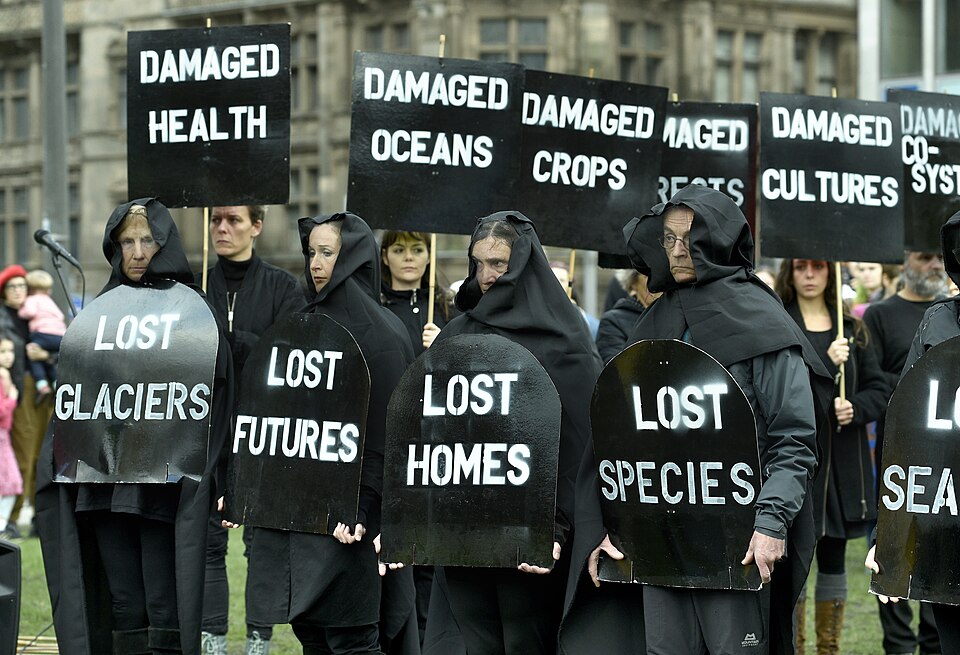Roland Chaplain is the Climate & Environment Officer of SNP Socialists
The dilemma facing all governments is how to pay for eliminating poverty and tackling climate change when trapped into an economic system designed to exacerbate both of these. The trap is one that forces governments to look for economic growth irrespective of whether what is grown actually meets human needs. Thus their focus is on growing what is taxable. Their start point is the flawed assumption that the only way to improve the health service, social care, education, public transport, etc. is through raising more taxes. That in turn encourages precisely the kinds of consumption patterns that exacerbate global warming.
We don’t know the way out of this conundrum. Sometimes we delude ourselves into thinking that lots of small contributors such as CCS, nuclear power, hydroponics, electric vehicles, heat pumps, etc. will in themselves each be the panacea we are all looking for. But, of course, they’re not. There are multiple planetary boundaries! That is why, we in the SNP’s Climate and Environment Group, in association with a range of climate campaign organisations and wider civic society worked on a motion to stimulate debate amongst SNP members on how to tackle this apparently insolvable problem.
In spite of all the work that went into drafting the wording of the motion, it didn’t even manage to make its way into the long list of potential motions for discussion at Conference. That is deeply disappointing as it shows that at the heart of SNP policy making there is a fear of venturing out of our comfort zone just at the time when to do so is most needed in a highly unstable and fractious world. Worse still we see an unwillingness to celebrate real major advances in enabling the building blocks for the kind of system change that has to happen. The opening paragraphs of the motion went to the heart of what is needed.
“Conference congratulates staff in Education Scotland and the SQA for the lead they are taking, as part of the Curriculum Improvement Cycle, in collaboration with teachers, to ensure that the skills needed by future generations to tackle the climate and nature emergencies are reflected in curricula at all levels and across subject boundaries.
Conference also welcomes efforts being made to provide reliable teaching materials relating to the geopolitics of climate change as a driver of international conflict & the role this plays in forcing migration.”
This motion came out of extensive work done by Education Scotland in response to The RMetS (Royal Meteorological Society) which released its Curriculum for Climate Literacy in May 2025, providing a framework for high-quality, cross-disciplinary climate education, rather than a single & final exam curriculum. This has helped inform thinking amongst those involved with the International Baccalaureate and national education systems elsewhere as well as being reflected in the widespread interest within Civic Society for COP30 to be the one where the balance between corporate and people power is addressed With this end in mind the motion was intended to start defining an independent Scotland’s position within a climate and nature crises driven geopolitics of the coming decades. What is being learned by today’s generation of young people is critical to Scotland having the range of skills needed to find answers to future challenges.
Entrepreneurship will need t be redefined so that the prime motivation is not making a quick buck from selling on the patent for one’s invention but rather finding satisfaction primarily through the amount of benefit the invention provides people in a new form of wellbeing economy. Education Scotland are already doing a fantastic job. This should be applauded. It is a story that needs to be told.
The motion would have provided an opportunity to highlight the role of the armaments industry in fuelling conflict and diverting resources from badly needed efforts to mitigate the effects of climate change. A good example of how such money should be being spent is to provide low cost solar powered micro-irrigation schemes for farmers in the Global South. How to fund this through taxing the super-wealthy is then addressed:
“In recognition that, within the current global economic system, it is incredibly difficult to levy wealth taxes to fund Loss and Damage restorative justice to any meaningful level, Conference welcomes efforts being made by the Global Solidarity Levies Task Force to come up with a more robust international system for doing just this.
Conference also welcomes the work being done by the RINGO Finance Group to develop a new model with BRICS group of nations, Particularly China, to develop a non-exploitative model for filling the gap left by the closing down of USAid.”
The paragraph relating to RINGO Finance lets the wider world know that we are serious about addressing the transfer of, mostly unethically, acquired wealth from the ultra-rich towards mitigating the consequences of climate breakdown on the world’s poorest people. The cessation of USAid and the 40% reduction in the UK equivalent are contributing to increasing numbers of deaths. China is leading the way in the BRICS group of nations (Brazil as COP30 host is one).
Their form of partnership and less exploitative colonialist model for aid concurs closely with Scotland’s empathy with that of the rights of all indigenous peoples. It is a pointer to how China may itself be changing in its approach to its own minorities. This in turn has longer term implications for a future Russia which could lose Chinese support if it continues down its current outdated, expansionist, colonial type approach. “The Global Solidarity Levies Task Force Strategic Plan for 2025” marks a hugely important step in informing delegates to COP30 in Brazil in November.
They will discuss how to access the wealth of billionaires and corporations with excessive profits (based mainly on unethical exploitation of workers and indigenous peoples). The Task Force’s deliberations will be given added momentum with the approach of COP31 next year when the focus looks like being restorative justice for all indigenous peoples. The reference to the BRICS group of nations is deliberate. The work by ‘Perspectives’ (German based in cooperation with Beijing University) is an important indicator for new ways of addressing how financial systems will have to be radically restructured for us to have any hope of averting some of the worst consequences of climate and nature disruption.
To this end the motion stated that:
“In order to consolidate Scotland’s international role through WEGo (Wellbeing Economy Governments), Conference calls for:
1. The creation of a Loss and Damage research Centre of excellence based within a Scottish University (or group of universities) managed by trustees from widely different walks of life as a check on any suspicion of inappropriate corrupting or political influences.
2. The Scottish Government to act as a guarantor for the integrity of the Centre’s research and the transparent publication of its findings”.
The idea of Scotland having an academically accredited Loss and Damage research centre has been mooted for a while. To counter the global influence of climate deniers, fossil fuels and armaments lobbyists, there is now a special urgency to move the vision for such a Centre forwards. However, universities have become increasingly financially exposed which is the reason for the wording of the final two sentences.
Additionally, the Motion recognises the importance of the contribution from those in the Scottish Government already working on ‘Loss and Damage’ Wellbeing Economics and Humanitarian and International Development. Being seen to be debating these issues is an extremely important part of the drive for international recognition for a future independent Scotland. It is also a statement of Scotland’s commitment to a new and fairer international order.
In conclusion: one must return to the fundamental question of what our human species is in the totality of nature and the evolution of life and consciousness on this planet. Our getting it wrong already has incalculable costs in present suffering with the prospect of even greater future suffering the longer we put off replacing an economic system that rewards greed and short term exploitation.
Watching the weather and reconnecting with nature whether through battling a storm to rescue an injured climber or swimming naked in a Scottish Loch in the world of the otter watched by the red squirrel gathering nuts on the shore is the kind of fundamental experience that will help us reconnect with a set of values that mustn’t get lost in our technology and money obsessed world. Otherwise, our species and so, so much more will perish.
Image credit: Lucas Werkmeister, CC BY 4.0 https://creativecommons.org/licenses/by/4.0, via Wikimedia Commons


